-
Car Reviews
- All reviews
- Midsize SUVs
- Small cars
- Utes
- Small SUVs
- Large SUVs
- Large cars
- Sports SUVs
- Sports cars
- Vans
Latest reviews
- Car News
-
Car Comparisons
Latest comparisons
- Chasing Deals
Buyers who snapped up a Toyota GR Yaris at the original driveaway price of $39,950 scored an incredible deal – and even though it’s now more expensive, the GR Yaris resets modern hot hatch benchmarks.

We’d wager that the Toyota GR Yaris is the most anticipated performance car release of 2020. Arriving just in time for Christmas, about 600 Australians will take delivery of one of the hot hatch bargains of the century before the year is out. Initially offered at an all-inclusive price of $39,950, the GR Yaris packs a big 200kW permanent all-wheel-drive punch for the price of a Hyundai i30 N.
Or – more accurately – it did. The first 1,000 cars offered at the earlybird price sold within hours, and a further 100 cars followed that batch at an increased price of $44,950 within a few weeks. Now that the second allotment is also sold out, the GR Yaris has reverted to its full retail price of $49,500 plus on-road costs – or about $54,000 driveaway.
Is it still a good deal? Should you still dive into GR Yaris ownership despite the fact it’s 35 per cent dearer now?
Ultimately, we think you should.
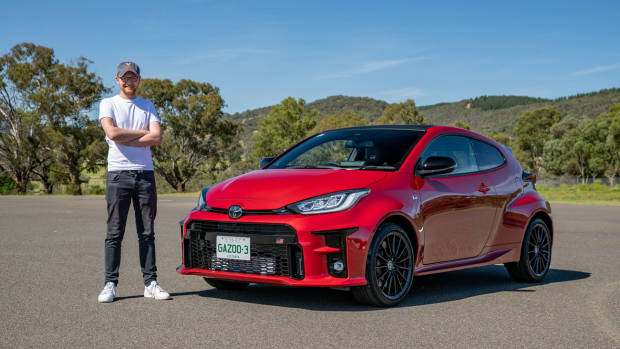
The GR Yaris resets benchmarks for what a hot hatch of this price can be.
While it isn’t a super-hatch in the same mould as the new, 310kW Mercedes-AMG A45, it’s about half the price of that car.
And yet, in terms of sheer capability, isn’t too far off – and we think Toyota’s new baby eclipses the AMG in terms of character.
What’s so special about it then? Well, the GR Yaris revives a rally car for the road formula that fell out of favour after the departure of the Mitsubishi Evolution half a decade ago.
This might look like a pumped-up Yaris grocery-getter, but this full-fat Gazoo Racing version is a very different beast under the skin. The front end mechanicals are taken from the Yaris but the independently-suspended rear end is from the bigger, more sophisticated new Corolla.
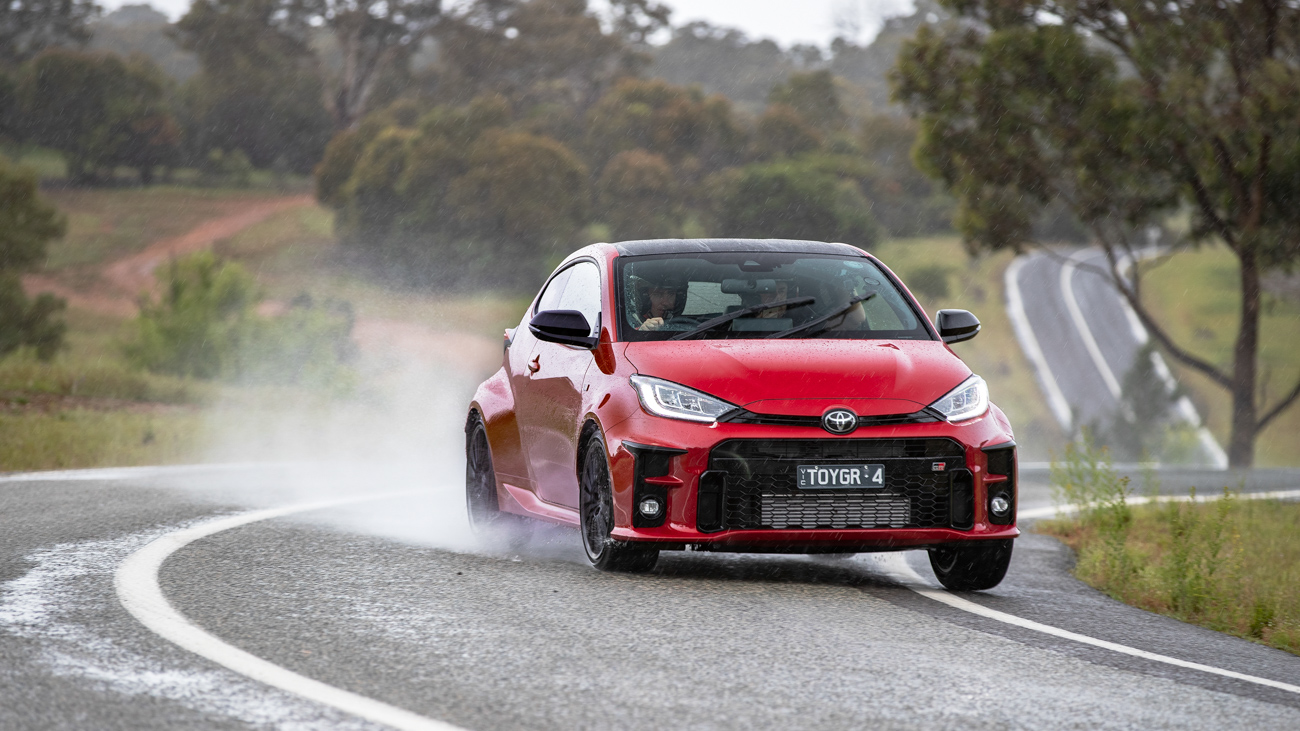
Built in Toyota’s Motomachi bespoke product plant by the same people that put together the Lexus LFA – and now this brand’s Mirai hydrogen EV – the GR Yaris is not an ordinary runabout.
Under the stubby bonnet is the world’s most powerful production three-cylinder engine – a new 1.6-litre ‘G16E-GTS’ turbo triple that produces a seriously muscular 200kW of power (268 horsepower) of power and 370Nm of torque. A six-speed manual is the only gearbox. No automatic is planned.
But it’s how the all-paw GR Yaris puts torque to the road that is of real interest. Unlike a Volkswagen Golf R, this is not an on-demand AWD system. It’s permanent, with all four corners receiving power under throttle.
A clutch pack lies between the propshaft and the rear differential, with the capability of distributing full torque to either rear wheel, though the GR Yaris offers drivers the ability to select from three torque split profiles: 60 front / 40 rear in Normal mode, 50 / 50 in Track mode, and our preference – 30 front / 70 rear in Sport mode.
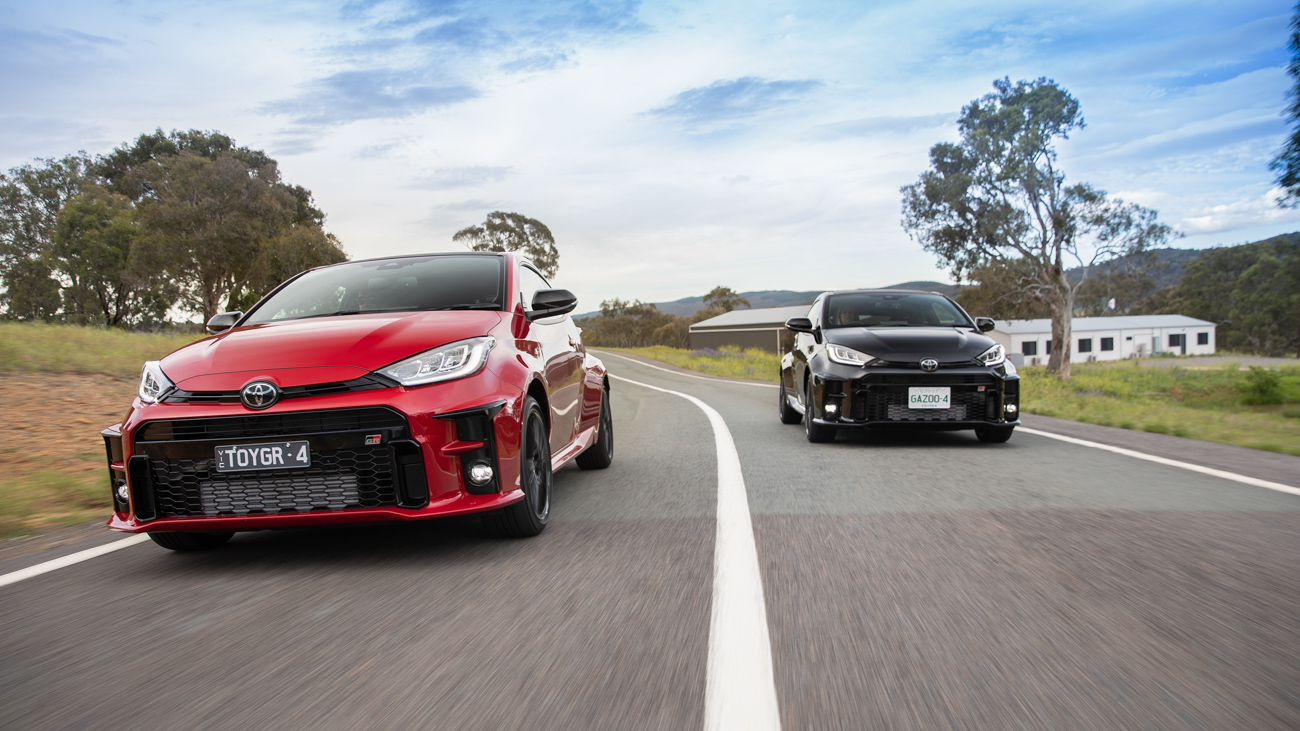
While they are referred to as modes, the only characteristic that changes is where the AWD system distributes torque. The engineers decided that a single steering weight and suspension mode were the right path, and in our view, this was the right path.
There’s heft to the steering once you’re at pace, but it isn’t quite to the point of feeling artificially weighted: just meatier than most hot hatch racks. The steering itself is precise, with a quick ratio. You can see the corners of the car from the driver’s seat – the combination of visibility and intuitive steering makes it simple to plot lines through bends.
Most hot hatches require careful management of the throttle and brake on corner entry – and the GR Yaris can cut a deft line as well as the best front-drive cars at this price point. But because of its permanent AWD system, it gives you many more options.
With the system set to throw seven-tenths of available torque – or 259Nm – to the rear axle, there’s heaps of capacity to correct your line under throttle. If the rear tyres are slightly wet, or if they’re convinced with a boot of the throttle, power oversteer is easily found.
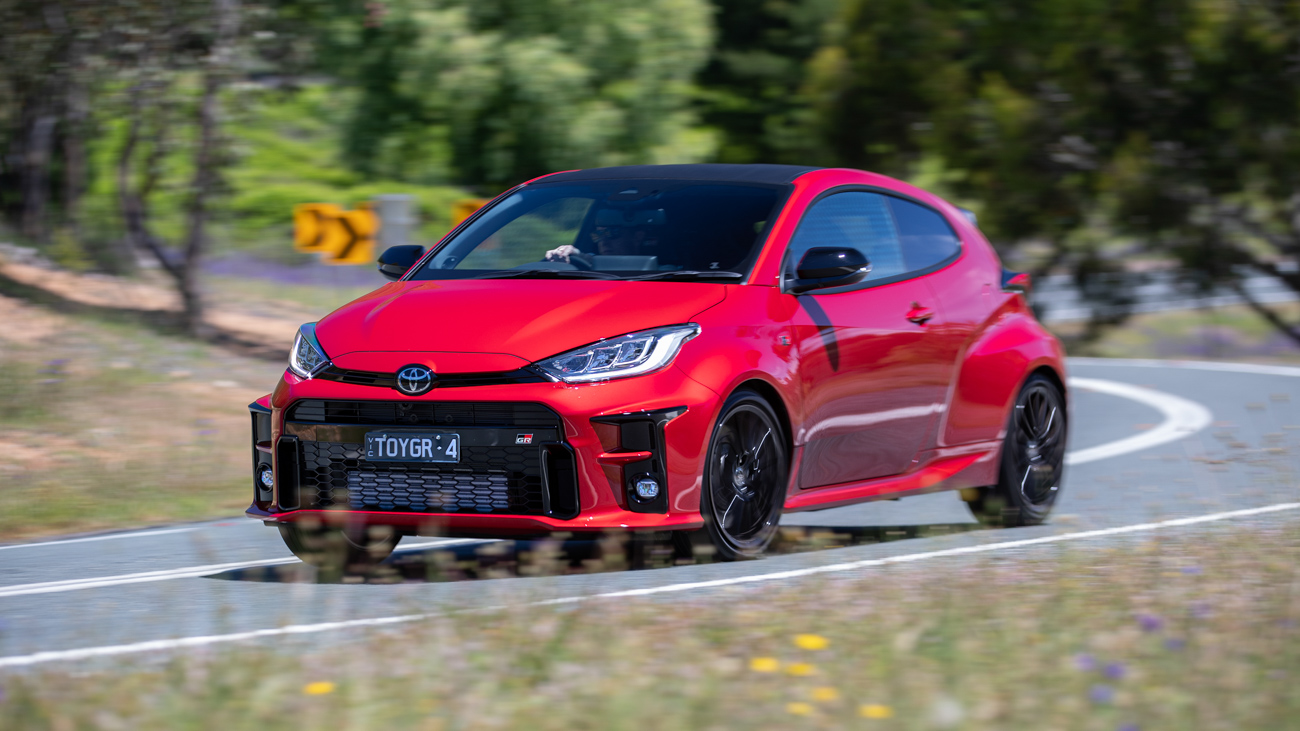
This was demonstrated with a wet skid pad on the launch of the GR Yaris, but a closed-road loop demonstrated the car’s willingness to gently oversteer even with the ESC system left on.
Then there’s the ride, which is a particularly well-balanced blend of control and compliance. While it’s certainly not as cosseting as a Volkswagen Golf R or even a Hyundai i30 N with that car’s recent damping update, the GR Yaris soaks up bumps common to Australian B-roads while dealing plenty of road feel into the mix.
That said, on a straight and level road, the GR Yaris never truly settles down. Long-distance touring comfort is adequate – we’d be fine to head to a distant track in one of these – but you tolerate the constant fidgeting rather than enjoy it.
And while the GR Yaris is especially good at piling on speed – 0-100km/h comes up in 5.2 seconds – it’s also good at wiping it off.
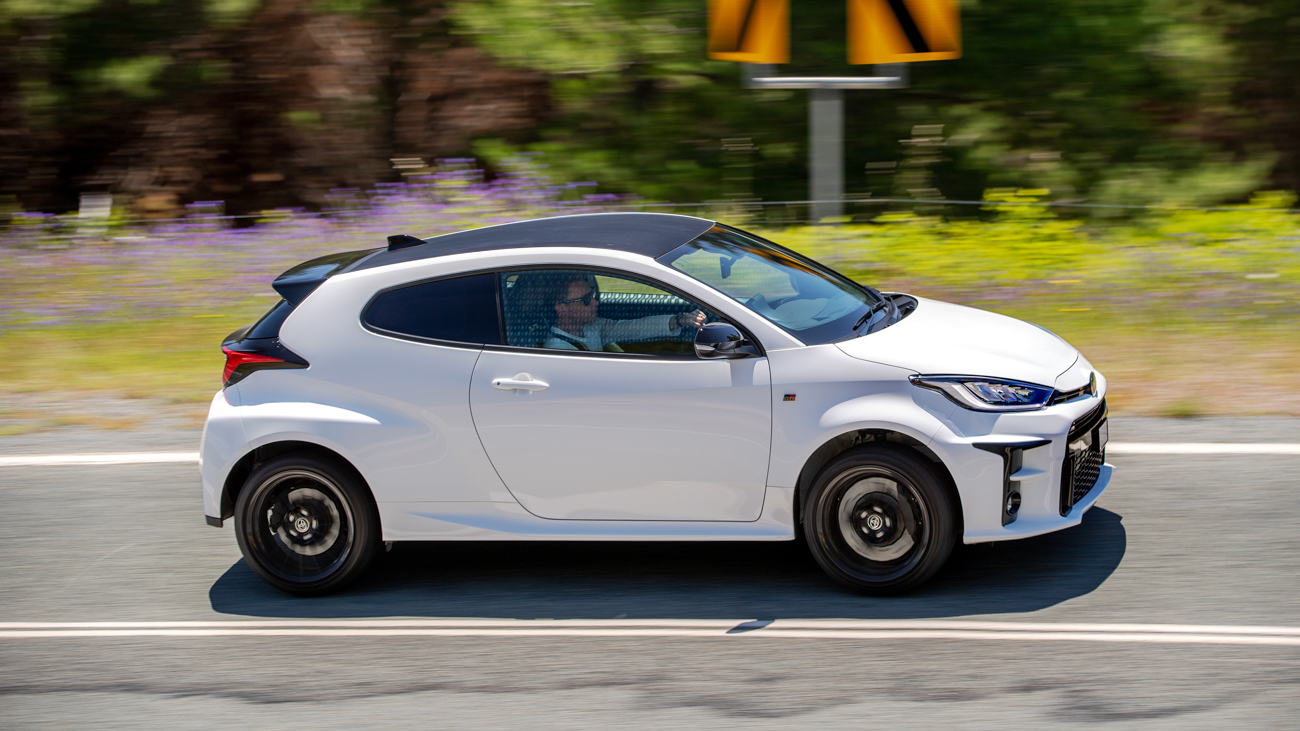
Huge 356mm two-piece ventilated discs with four-piston callipers sit on the front axle, while at the rear, you find 297mm ventilated discs with two-piston callipers. Braking performance at high speed on the closed-road loop we experienced was impressive.
The GR Yaris also packs Toyota’s Safety Sense suite of semi-autonomous technologies. While it doesn’t carry a centre airbag – meaning it won’t get the standard Yaris’s five-star ANCAP rating – this car gets a bunch of crash-avoidance tech. The AEB functions include pedestrian and cyclist detection, plus junction-oncoming braking. There’s lane keeping assist, blind spot monitoring, rear cross traffic alert, and a reversing camera. Almost all of these can be defeated.
Inside, the GR Yaris has everything you need and nothing you don’t.
That being said, this won’t go down as one of the great hot hatch cabins. The GR Yaris interior is adequate – fit for purpose, even. But just like the Hyundai i30 N, it’s a space that shares much with its more affordable donor car because the money was spent on the mechanicals – where it counts.
It’s easy to quickly name the faults here. The driving position is high – and the passenger seat is way too high, lacking any altitude adjustment. There’s no armrest. The heads-up display can’t be seen through polarised sunglasses. And most of the materials in here are rock-hard.
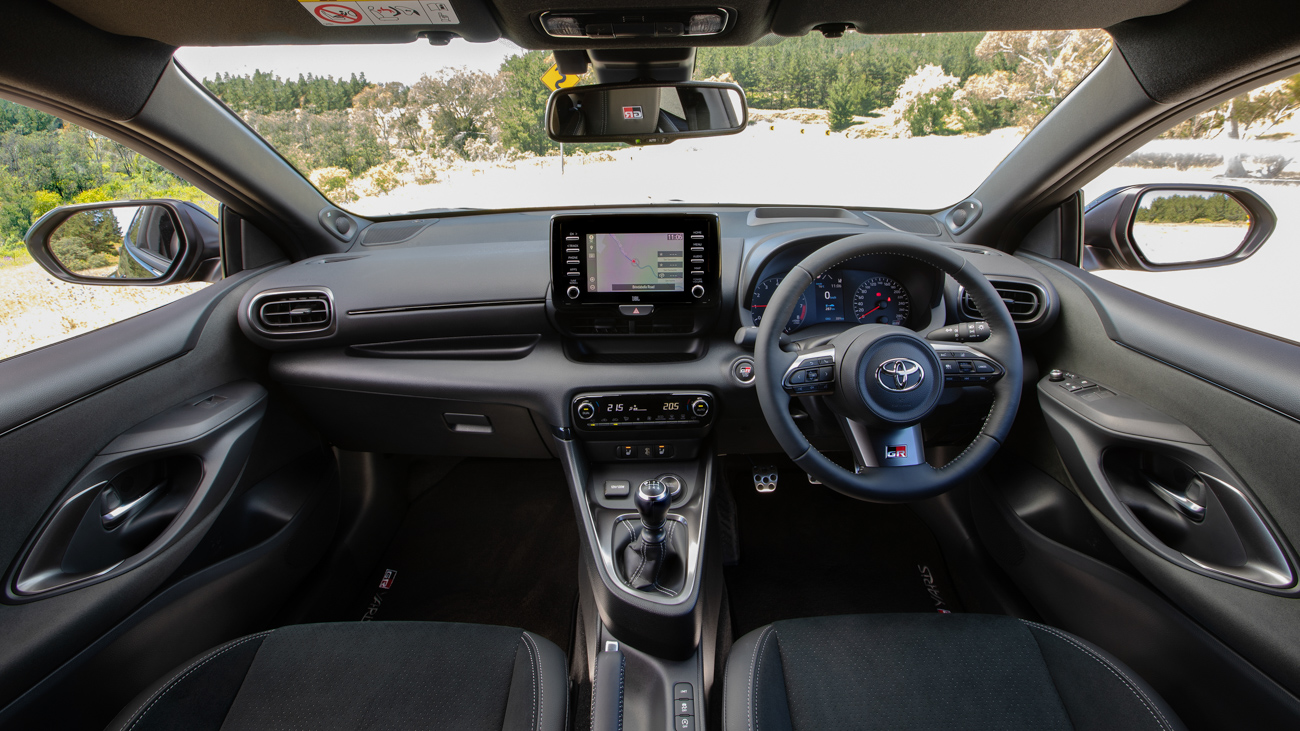
But these failings aren’t what you think about when you’re exploiting the GR Yaris’s supremely engaging dynamics. They will matter if you end up running the GR Yaris as a commuter for most of its life – but if this is a car you’ll reserve for weekend blats, we doubt you’ll notice.
In actual fact, we find the Spartan simplicity of the GR Yaris cabin somewhat reassuring. It, quite precisely, isn’t loaded with unnecessary tech. It shares a seven-inch central touchscreen with the regular Yaris hatchback, and this works fine – Toyota’s software is intuitive, and there is wired Apple CarPlay and Android Auto. Plus there’s a reasonable JBL stereo for good measure.
But that’s about it. A small colour trip computer with digital speedo sits between flat-faced, readable analogue gauges that tells you what you need to know.
There are smartly laid out knobs and buttons for key functions – volume, fan control, temperature, and then more interesting stuff like the variable-split AWD system.
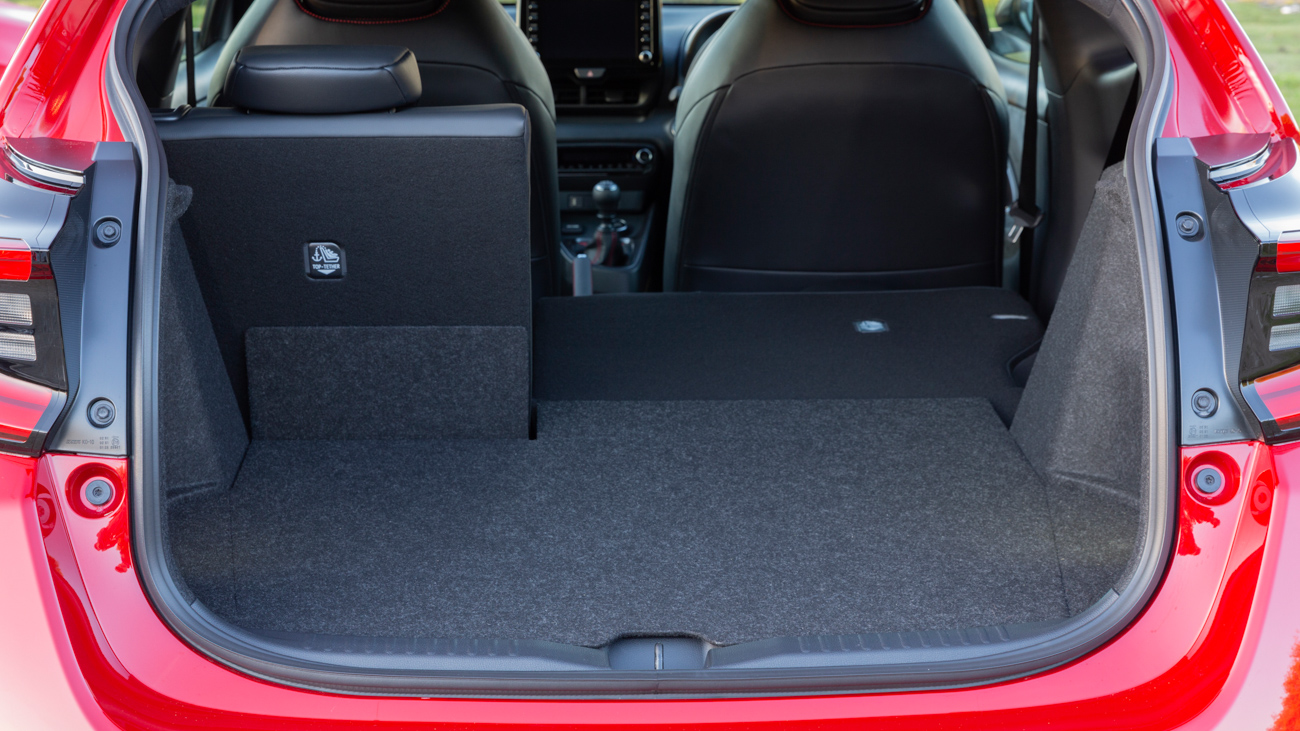
Importantly, Toyota have gotten the GR Yaris’s steering wheel right. Avoiding the trend of unnecessarily thick rims – we’re looking at BMW M and M Sport cars – the GR Yaris tiller is small in diameter, circular, and easy to grip onto. There are a bevy of shortcut buttons on the thin spokes but as an object, it feels right.
The seats are also reasonable, save for their undercooked height adjustment. They’re best described as sports seats, not buckets, but they are finished in a classy leather and suede mix, they’re heated, and they are fairly comfortable. We emerged from a couple of hours of hard driving without too many creaks.
Covered storage is at a real premium in here, though, so you’ll want to hide valuables away in the glovebox or in the boot. The door bins are also too small. And the plastics used on the doors are hard. Overall, it’s not an expensive-feeling interior, but it feels fit for the job at hand.
There are back seats, though legroom is so limited that it’s best thought of as additional storage space, supplementing the tiny 141 litre boot. Unfortunately, there’s no spare of any kind under the boot floor, limiting to some degree our country-touring confidence. Instead, there’s the 12-volt battery, which is removed from its usual spot in the engine bay to aid weight distribution.
The GR Yaris certainly isn’t the most affordable Toyota to run.
Where mainstream Toyotas have impressed in recent years with their longer service intervals and amazingly inexpensive capped-price maintenance deals, the GR Yaris is more expensive and less convenient to maintain.
In many ways that is understandable due to the complexity of the machine here, which uses a bespoke engine and permanent AWD system not seen in any other vehicle this brand makes.
That means servicing every six months or 10,000km – short intervals by anybody’s measure of a modern performance car. And just four of those services, or two years, are covered under Toyota’s price-cap scheme.
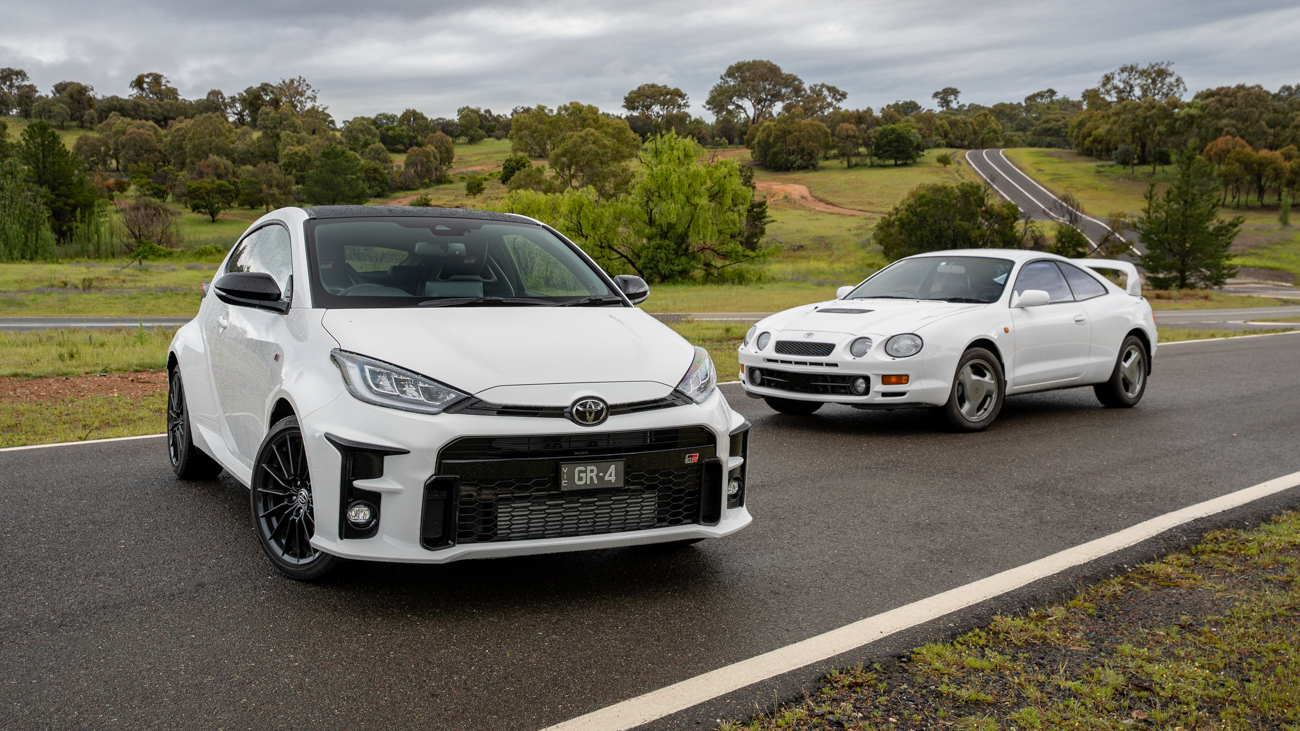
By the end of the second year you will have paid $1,664 to service the GR Yaris on time, compared to just $390 for a regular Yaris hybrid – though that car can’t do a fraction of what the hotted-up version can.
At least you enjoy Toyota’s five-year unlimited kilometre warranty on the GR Yaris, though the company was not willing to issue a blanket statement about non-competitive track use. Hyundai says that kind of work will not void the warranty of their i30 N hot hatch. Toyota says they will assess customer claims on a case-by-case basis.
As for fuel consumption, Toyota claims economy of 7.6L/100km, and the GR Yaris is a top-shelf drinker, accepting only 98-octane petrol fuel. Our drive of the GR Yaris on country roads reflected consumption only slightly above this figure, though we didn’t get the chance to sample this hot hatch in town.
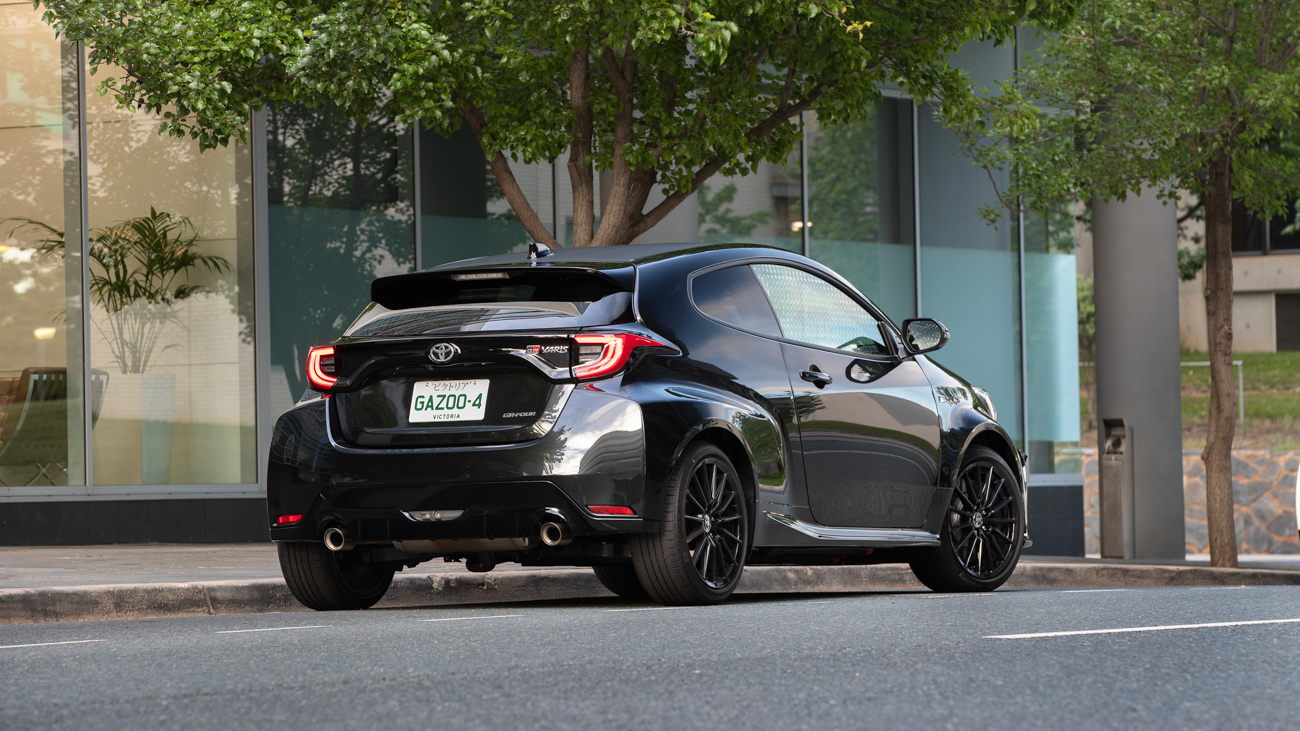
The GR Yaris is such an important car for Toyota. It’s this brand’s first in-house Gazoo Racing performance product, following the release of the Supra. That was a great collaborative effort with BMW – but the GR touch to the Yaris shows just how advanced Toyota’s sports-car capabilities are.
Capabilities that had been forgotten about to a significant extent have been reawakened by a project to develop one of the world’s finest hot hatches. A rally car for the road.
While we think that savvy buyers who snapped up an example for under $40,000 driveaway did particularly well, we think that even at the new price of $49,500 plus on-road costs the GR Yaris deserves close consideration.
It is an interesting, impressive hot hatch with real grit.
The pairing of a permanent AWD system allowing a rear bias to the world’s most powerful production three-cylinder engine give the GR Yaris a character of its own in this field.
We wouldn’t buy a hot hatch without at least test driving this one.
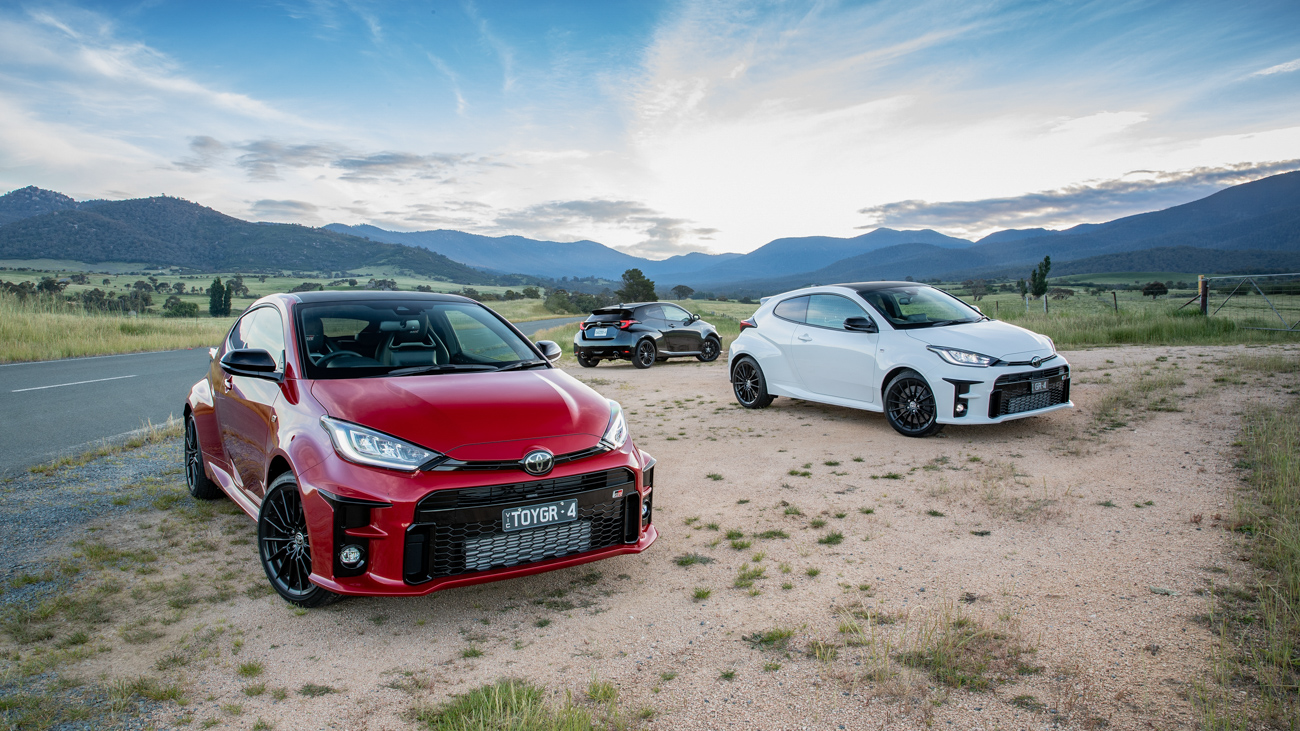
Key specs (as tested)
About Chasing cars
Chasing Cars reviews are 100% independent.
Because we are powered by Budget Direct Insurance, we don’t receive advertising or sales revenue from car manufacturers.
We’re truly independent – giving you Australia’s best car reviews.
The estimate provided does not take into account your personal circumstances but is intended to give a general indication of the cost of insurance, in order to obtain a complete quote, please visit www.budgetdirect.com.au. Estimate includes 15%^ online discount.
^Conditions Apply
Budget Direct Insurance arranged by Auto & General Services Pty Ltd ACN 003 617 909(AGS) AFSL 241 411, for and on behalf of the insurer, Auto & General Insurance Company Limited(ABN 42 111 586 353, AFSL 285 571).Because we don’t know your financial needs, we can’t advise you if this insurance will suit you. You should consider your needs and the Product Disclosure Statement before making a decision to buy insurance. Terms and conditions apply.
Indicative quote based on assumptions including postcode , 40 year old male with no offences, licence suspensions or claims in the last 5 years, a NCD Rating 1 and no younger drivers listed. White car, driven up to 10,000kms a year, unfinanced, with no modifications, factory options and/or non-standard accessories, private use only and garaged at night.
^Online Discounts Terms & Conditions
1. Discounts apply to the premium paid for a new Budget Direct Gold Comprehensive Car Insurance, Third Party Property Only or Third Party Property, Fire & Theft Insurance policy initiated online on or after 29 March 2017. Discounts do not apply to optional Roadside Assistance.
2. Discounts do not apply to any renewal offer of insurance.
3. Discounts only apply to the insurance portion of the premium. Discounts are applied before government charges, taxes, levies and fees, including instalment processing fees (as applicable). The full extent of discounts may therefore be impacted.
4. We reserve the right to change the offer without notice.